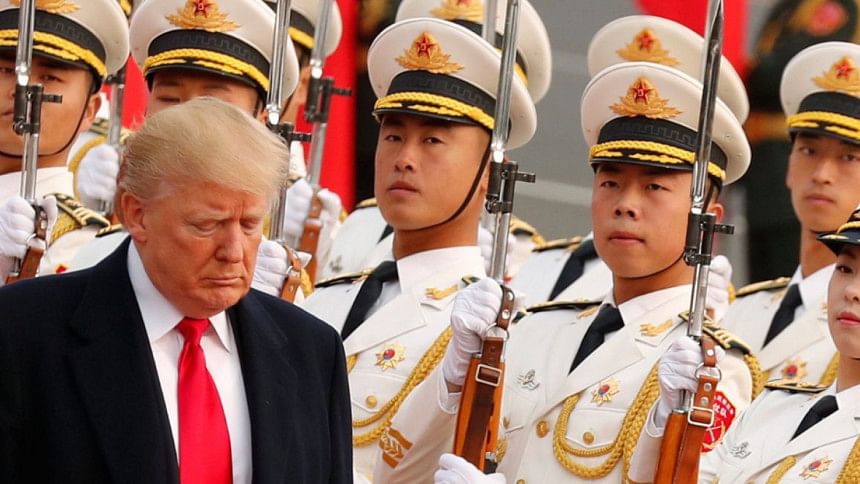Thinking the unthinkable: A 'Chinese' Century?

Henry Luce deserves more than the credit he gets for predicting the "American Century" (in Life magazine, February 1941). That was after the League of Nations was unceremoniously buried, but before both the Pearl Harbor bombings, which awakened a slumberous and isolationist United States (that is but a slight exaggeration, since the United States was indirectly helping European countries against Adolf Hitler), and adopting the global leadership mantle after World War II. His choice of words encouraged history-oriented International Relations observers to find an even more perfect example of this "century" association: a "British Century", from the Corn Laws of 1846 to the end of World War II in 1945, stood out. Though the US Century did not quite fit the precise dictionary definition of "century", or Britain's amazing illustration of that precision, it still credits Luce. Even more can be attributed to him since we can now conceive of another "century" today, precisely in the country where he was born (of missionaries): China.
We could not make that same claim of Japan in the 1970s and 1980s, when the United States began what it is doing today: economically bashing a perceived rival. Nor could it be said of the European Union in its 1990s hey-days. No other country can rise to that lofty rival stature.
Motivating the "China Century" thought necessitates considering the very pillars of leadership: trade (the capacity to outcompete others, find more markets than ever before, and obtain raw materials far easier than previously); investment (the capacity to build tomorrow's infrastructures and lift other countries, that is, possible followers, incapable of doing so by themselves); security (not a necessary condition as China shows, but pivotal to both Britain and the United States, although it is poised to serve in a sufficient capacity to prolong China's economically-built leadership); and ultimately a rationale, that is, an ideological framework to hang its leadership upon (Britain's was "free trade", the US' "free world").
Britain became the modern world's first free-trader, with the United States following (though blamed as a protectionist even before Trump's time, the United States has the lowest average tariff levels among all power-contenders). How does China fare?
From being filled to the brim with low-waged Chinese imports, the world should not have any qualms answering that. In the late 1980s, our complacent belief was that an ostracised communist country should be allowed to return to the free world. We did not bother evaluating the consequences (we never do: only when the consequences arise, we panic). They were not too gigantic, then, for us to notice, but slowly and steadily, China became overpowering financially: its surpluses in countries with money, and deliberate deficits with their poorer counterparts, enabled China to establish footholds too secure to dismantle now. As those surplus accumulations have ballooned beyond 5 trillion USD, we now see the consequences: China rebuilding the rest of the world such that no country can turn away, or even want to turn away. At the end of the day, a potential world leader emerges virtually unnoticed, as if by the back-door, and without winning any military conflict (as the United States did in World War II).
Armed with that cash, it consciously set out to lay the global leadership footprints; and it did so by reviving its own former global leadership formula. The Great Silk Route paved the way for a 21st Century Belt-Road Initiative (BRI) that began to establish trade routes all over the world, much like Britain did to manage its colonies through outposts in Gibraltar, Hong Kong, and Singapore; and the United States did less successfully with a multilateral trading instrument from 1947 (GATT) and a spate of security arrangements (NATO, among others), shortly thereafter. We would not know that this BRI network would slowly be fitted with China's security citadels (its own Gibraltar, Hong Kong, and Singapore), as the South China Sea island-building exercise, and naval bases in Djibouti and Gwador, indicate today.
Developing countries, by and large, began aping China's success, while developed countries were too much in awe of tapping a billion consumers to see the big-picture. At the end of the day, China was building more infrastructures globally than any single country has ever done in human history, except, of course, that original one: China itself, building the original Great Silk Route to Europe. With its trillions of stored cash, it could help the developing countries jump-start their upward-mobility race. The previous leader, the United States, through its principal organ, the World Bank, was already doing so, albeit too slowly, sporadically, and selectively after the stunning Marshall Plan success in West Europe. China has also been charging higher-than-World Bank interest rates. When recipient countries fail to pay back, as Ethiopia, representing Africa, and Sri Lanka with its Hambantota port, representing Asia, Chinese companies lease the franchise for the very long-term. This awaits Burma, Cambodia, and Pakistan, among other recipients of Chinese aid.
Diluting this anticipated pressure, China built the Asian Infrastructure Investment Bank (AIIB). AIIB claims representation as global as the World Bank itself, and poses a serious potential challenge to the World Bank. With more Chinese carrots than sticks at play, when AIIB shifts the developmental traffic-flow from Washington to Beijing, we will have seen the fait accompli of Chinese leadership.
With trade and investment pillars firmly installed, China needs to next build its security foundations to claim world leadership. Anyone following relative global military expenditures will notice how China's proportion has not only been growing (at USD 175 billion in 2018, 8.1 percent more than in 2017; and its USD 146 billion in 2016 was 11 percent more than in 2014), but also in very strategic arenas: securing trade-flows (Hambantota and South Sea Island patrolling the risky Malacca Straits), particularly of energy (Djibouti and Gwador patrolling the vital Persian Gulf), is one; nuclear-weapon construction another (its 270 nuclear warheads equals both India's and Pakistan's, exceeds Great Britain's by 55, remains 30 short of France's, but falls far behind Russia's 7,000 and the 6,800 of the United States); outer-space (with space-based solar energy power generators a priority); and selling to other countries (now the world's third largest arms-exporter). China is everywhere.
Two observations close this discussion. First, historically Chinese leadership, like Britain's, has always preferred the economic route over security: wars disrupt, and China wants less of that. Playing a business-like game with China will fetch the maximum rewards for others. Second, the "Chinese Century" neither encourages nor discourages democracy, since that is an Anglo-Saxon contribution to the world. Yet, at heart, since authoritarianism speeds up policy-making, China's Century may be a century of dictatorships. Saying sayonara to democracy may be far closer to us at this juncture than ever before. Likewise, promoting democracy, as against the Soviet Union, may become the one threat to unravel China's leadership.
Why China cannot go a full century may become the lesser question than how we missed this progression from 30-years ago, or where the new democracy fulcrum may emerge since it is under enormous stress where it originated. Any BRI-hosting volunteer?
Imtiaz A Hussain is the head of Global Studies & Governance Program at Independent University, Bangladesh (IUB).





Comments